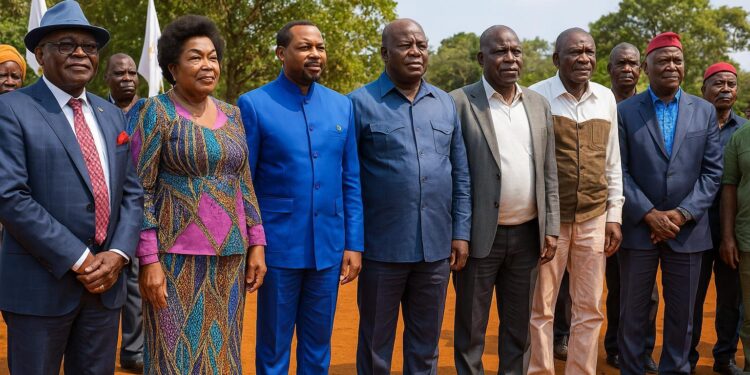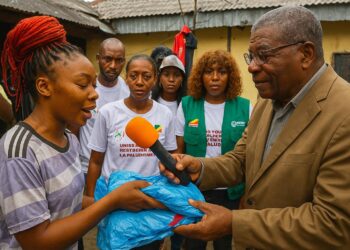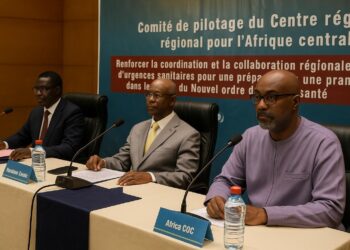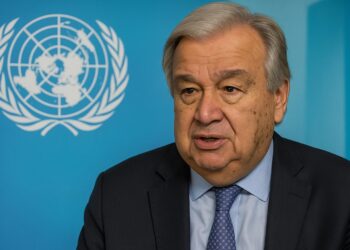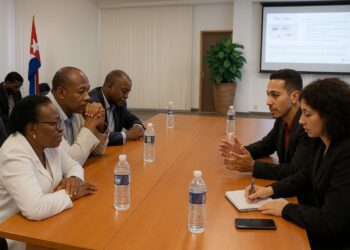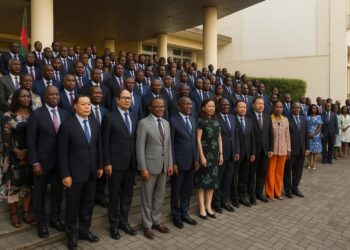A Lifeline Through Pool Department
With drums echoing across the emerald hills of Pool, Minister of Urban Sanitation, Local Development and Road Maintenance Juste Désiré Mondelé formally opened works on the 86-kilometer Mpiem–Kindamba road on 8 August 2025, marking a fresh chapter in Congo-Brazzaville’s rural infrastructure strategy that aligns with national connectivity targets.
The dirt corridor, long battered by tropical downpours and erosion, ties Kindamba, Kimba, Mayama and Vinza to the national Route 1 near Mpiem. For farmers and traders, every rainy season previously meant ankle-deep mud, spiraling transport prices, and stalled ambulances wrestling with swollen streams along the fragile piste.
Detailed Engineering and Financing
Government documents place the primary contract with Société d’Interventions Pétrolières et Agricoles Modernes, SIPAM, at 1.7 billion CFA francs, roughly 2.8 million dollars. Engineers will widen the right-of-way to ten metres, rebuild the platform with twenty-centimetre lateritic layers, and reinforce slopes that seasonal torrents have gnawed over the past decade.
A parallel 504 million-franc lot awarded to Universelle Atlantique BTP covers nineteen concrete box culverts, including a twin span at PK42 replacing a failing Bailey bridge. Civil-works planners argue that precast dalots are faster to install and resilient against flash floods increasingly reported by foresters and local road patrols.
Economic Multiplier for Agricultural Basins
The Pool region’s red soils produce cassava, peanuts, plantain and brisk livestock streams that feed Brazzaville’s wholesale markets. By easing axle loads and travel time from six hours to barely two, the upgraded route could, officials say, catalyze output gains of up to thirty percent within five years.
Landry Francis Gouloundou, director general for road maintenance, frames the project as a textbook example of post-conflict dividends, arguing that ‘connectivity translates into inclusive growth, not abstract budgets.’ His remarks echo African Development Bank studies linking one kilometre of rural road to a three-percent poverty decline statistically observed.
Traders interviewed in Mindouli’s Wednesday market plan to charter larger lorries once axle-breaking ruts are history. Olive Boungou, a produce aggregator, predicts that tomato losses will shrink because ‘drivers will no longer sleep along the track waiting for dawn to cross the riverbed,’ bolstering fresh deliveries to towns.
Governance, Monitoring and Deadlines
Minister Mondelé insists the six-month calendar is realistic, citing dry-season windows and financial commitments already secured in the 2025 budget. A joint committee with representatives of the prefecture, civil society and the contractor will publish fortnightly progress bulletins to pre-empt the cost overruns haunting past ventures in Pool.
The ministry has contracted the National Laboratory of Public Works to run granulometric tests on laterite and certify compaction. Transparency advocates welcome the step, after the 2023 Nkayi-Loudima road faced premature cracking. ‘Quality control is cheaper than rehabilitation,’ acknowledges engineer Claudette Ngoma, who will supervise on site daily.
Funding is entirely domestic, drawn from the Road Maintenance Fund and supplemented by a special allocation ratified by parliament last June. Economists note that mobilizing local capital limits exchange-rate exposure, a prudent tactic as the franc-CFA zone negotiates post-COVID debt headwinds with multilateral institutions and private bond markets.
Regional Connectivity and Diplomatic Optics
The Mpiem–Kindamba axis intersects trails leading toward the Angolan enclave of Cabinda, offering future trade synergies if security conditions stabilise. Brazzaville’s diplomats quietly court cross-border road harmonisation under the Central African Economic Community agenda, viewing asphalt, not declarations, as the surest guarantor of shared prosperity in Lower Congo.
International observers draw parallels with Cameroon’s integrated corridor programme, where logistics savings of fourteen percent were registered two years after completion. Should the Pool project deliver similar efficiencies, Congo could strengthen its negotiating hand in forthcoming AfCFTA logistics talks, according to policy analyst Borel Diafouka in Brazzaville today.
China’s Exim Bank representatives, while not directly financing the current works, attended the launch. Analysts read the presence as a hint at potential Phase-II paving discussions, perhaps under a public-private partnership. Such optics, diplomats note, expand Brazzaville’s portfolio of prospective lenders without binding commitments at this early stage.
Regional journalists, mindful of the Pool’s history of unrest, probed security guarantees for contractors. Prefect Jules Moukala Tchoumou affirmed that defence forces maintain patrols along the corridor, while community leaders have pledged labour to clear brush, deepening local ownership and reducing idle youth vulnerabilities during the works period.
In conversations with this magazine, deputy Adelaide Moungani highlighted the symbolic resonance of launching the first tranche in Mindouli, a district that once hosted displaced families. ‘Infrastructure is reconciliation made concrete,’ she said, reflecting a broader government narrative tying physical reconstruction to social healing within Pool’s communities today.
Whether measured in travel minutes saved or in diplomatic capital accrued, the road’s recalibration exemplifies Congo’s effort to convert budgetary discipline into visible, people-centred dividends. Stakeholders now watch grading blades bite into laterite, aware that on-time delivery could set the template for wider national roll-outs infrastructure boom ahead.

































